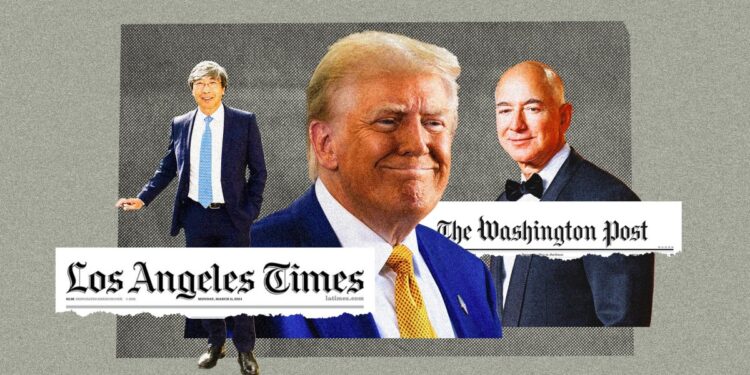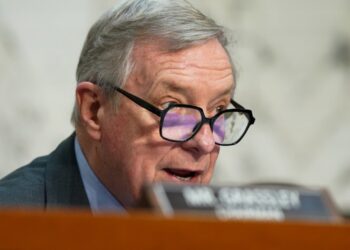National newspaper endorsements probably don’t make much of a difference in presidential elections (local ones are a very different story). So in terms of the outcome on November 5, the billionaire owners of the Washington Post and LA Times spiking endorsements of Kamala Harris that their respective editorial boards had already drafted probably won’t move the needle. But in terms of what we can expect from America’s media moguls in the face of a growing authoritarian movement, this was a lights-flashing-red moment—and it should mobilize everyone who cares about democracy.
Because this is not just about LA Times owner Patrick Soon-Shiong and WaPo owner Jeff Bezos. It’s about whether we can afford a press dependent on billionaires and corporate bean-counters; a press whose courage (or spinelessness) depend on how the owner is feeling that day.
Here’s just a sample of who controls our major newsrooms right now. The five biggest newspaper chains in America are owned by a hedge fund, a private equity fund, another hedge fund, a billionaire family, and another billionaire family. Among major television news networks, owners include the Murdoch family, Disney, Comcast, Paramount, and Warner Brothers Discovery.
Will these owners respect journalistic independence? We don’t have to guess. Soon-Shiong was previously in the headlines for pushing to kill LA Times coverage involving a friend of his and his dog. (His editor in chief ultimately resigned.) Lewis, the publisher Bezos hired for the Post, reportedly pushed his team to stop investigating his role in a British eavesdropping scandal. NBC president Cesar Conde put a powerful documentary about Trump’s child separation policy on ice until after the election. And let’s not even talk about Mark Zuckerberg and Elon Musk, whose platforms profit from pumping out disinformation while suppressing actual news.
But the newsroom pressures of the past may be child’s play compared to what could happen under a second Trump administration. Already, simpering executives are lining up to make nice with a president whose vengeance could punish and whose whim could reward them.
(Not that a non-endorsement will save anyone from Trump’s wrath: The only thing that satisfies him is Fox News-style bootlicking, and even that network isn’t allowed to get out of line for a minute. But maybe Bezos is betting that he can pull a Mark Zuckerberg, who after calling Trump “badass” was patted on the head for “staying out of the election”).
We can’t look into Bezos’ or Soon-Shiong’s hearts to see whether their decisions were driven by “anticipatory obedience,” by hopes of drawing conservative readers—whom Bezos, according to the New York Times, has identified as a growth market—, or by fears for their bottom line (on the day that the Post publicly spiked its Harris endorsement, executives from Bezos’ space company, Blue Origin, which has millions in government contracts, met with Trump.) It’s possible, too, that they just didn’t want the hassle: Bezos might not have wished to defend an endorsement at his next birthday bash and Soon-Shiong might have had Thanksgiving dinner in mind. But such nonchalance certainly doesn’t inspire confidence that they’ll show any spine when authoritarians knock on their newspapers’ doors.
Depressing? Yes. But let’s not end the story there, because billionaires and corporations are not the only players in the media business. There are thousands of newsrooms all over the country that are independently owned or nonprofit organizations, including Mother Jones. No one owns us, and no one ever will. We’re accountable only to you, our audience. Seventy percent of our budget comes from individual supporters, and this is the place where I say, as loudly and urgently as I can, that I hope you’ll join them. That’s what gives us the independence to investigate oligarchs instead of cowering before them.
Want to do more? There is a non-corporate newsroom in pretty much every community of the country (and also many that specialize in particular issues, from criminal justice to climate change to reproductive rights). Find yours. These journalists are incredibly hard-working, efficient, and fearless—I know because we often partner with them. And they—all of us—are chronically starved for money. I can speak from experience at Mother Jones, where this time of the year means losing sleep because I don’t know how we’ll put together a budget for the following year to maintain a newsroom full of the bravest, toughest reporters anywhere. (In total, our budget for a year is a smidge under what Jeff Bezos earns in four hours.)
But here’s what we have that is worth more than all the superyachts and megamansions in the world: The knowledge that when we are ready to publish, no one can tell us not to. Thanks to you. Please join our team of supporters (you can also subscribe to our award-winning print magazine) and help us finish this election cycle strong.







